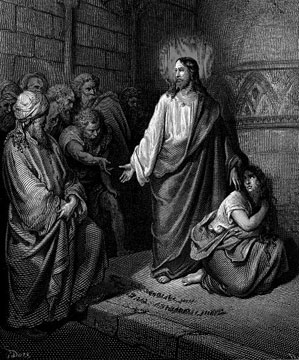Old Testament Message
If a man commits adultery with the wife of his neighbor, both the adulterer and the adulteress shall be put to death. — Leviticus 20:10
New Testament Message
Owe no one anything, except to love one another; for the one who loves another has fulfilled the law. The commandments, "You shall not commit adultery; You shall not murder; You shall not steal; You shall not covet"; and any other commandment, are summed up in this word, "Love your neighbor as yourself." Love does no wrong to a neighbor; therefore, love is the fulfilling of the law. — Romans 13:8-10
Gospel Message
 |
| Jesus and the woman taken in adultery — Paul Gustave Doré, 1865 |
The scribes and the Pharisees brought a woman who had been caught in adultery; and making her stand before all of them, they said to him, "Teacher, this woman was caught in the very act of committing adultery. Now in the law Moses commanded us to stone such women. Now what do you say?" They said this to test him, so that they might have some charge to bring against him.
Jesus bent down and wrote with his finger on the ground.
When they kept on questioning him, he straightened up and said to them, "Let anyone among you who is without sin be the first to throw a stone at her." And once again he bent down and wrote on the ground.
When they heard it, they went away, one by one, beginning with the elders; and Jesus was left alone with the woman standing before him.
Jesus straightened up and said to her, "Woman, where are they? Has no one condemned you?"
She said, "No one, sir."
And Jesus said, "Neither do I condemn you. Go your way, and from now on do not sin again." — John 8:3-11
A great rabbi stands teaching in the marketplace. It so happens that a husband finds proof that morning of his wife's adultery, and a mob carries her to the marketplace to stone her to death. (There is a familiar version of this story, but a friend of mine, a Speaker for the Dead, told me of two other rabbis that had faced the same situation. Those are the ones I'm going to tell you.)
The rabbi walks forward and stands beside the woman. Out of respect for him the mob forbears, and waits with the stones heavy in their hands. "Is there anyone here," he says to them, " who has not desired another man's wife, or another woman's husband?"
They murmur and say, " We all know the desire. But, Rabbi, none of us has acted on it."
The rabbi says, "Then kneel down and give thanks that God made you strong." He takes the woman by the hand and leads her out of the market. Just before he lets her go, he whispers to her, "Tell the lord magistrate who saved his mistress. Then he'll know that I am his loyal servant."
So the woman lives, because the community is too corrupt to protect itself from disorder.
Another rabbi, another city. He goes to her, and stops the mob, as in the other story and says, "Which of you is without sin? Let him cast the first stone."
The people are abashed, and forget their unity of purpose in the memory of their own individual sins. Someday, they think, I may be like this woman, and I'll hope for forgiveness and another chance. I should treat her the way I wish to be treated.
As they open their hands and let the stones fall to the ground, the rabbi picks up one of the stones, lifts it high over the woman's head, and throws it straight down with all his might. It crushes her skull, and dashes her brains onto the cobblestones.
"Nor am I without sin," he says to the people. "But if we allow only perfect people to enforce the law, the law will soon be dead, and our city with it."
So the woman died because her community was too rigid to endure her deviance.
The famous version of this story is noteworthy because it is so startlingly rare in our experience. Most communities lurch between decay and rigor mortis, and when they veer too far, they die. Only one rabbi dared to expect of us such a perfect balance that we could preserve the law and still forgive the deviation.
So of course, we killed him.
— San Angelo, Letters to an Incipient Heretic, trans. Amai a Todomundo Para Que Deus Vos Ame Cristão, 103:72:54:2